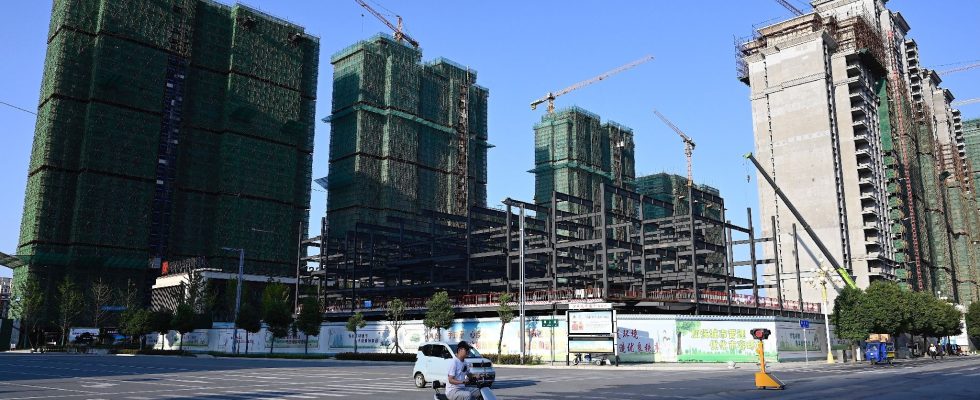A real estate giant threatens the Chinese economy again, two years after the setbacks of the Evergrande group. The action of the promoter Country Garden, one of the largest groups in the sector in the country, lost this Monday, August 14 in the morning more than 16% on the Hong Kong Stock Exchange, where it is listed. The precarious financial health of the company and its astronomical debt had already worried the markets for several days. Its situation is the consequence of a crisis of unprecedented magnitude in real estate in China, a sector which, along with construction, has long represented a quarter of the country’s GDP.
Already last Monday, Country Garden, which has long been reputed to be financially sound, was unable to make two interest repayments on loans. Mainly present in secondary cities, the group, which employs tens of thousands of people, was still last year the biggest seller of real estate in China despite the crisis in the sector. It is listed in the Forbes list of the 500 biggest companies in the world and its boss, Yang Huiyan, was until recently the richest woman in Asia. The group now has a 30-day grace period and risks defaulting in September.
On Friday August 11, the boss Yang Huiyan admitted in a letter of apology that her company was facing, because of the economic situation, “the greatest difficulties” since its creation. Against all odds, Country Garden announced during the weekend to suspend the quotations of a dozen obligations as of this Monday. This decision causes nervousness on the markets because the group estimated its debt at some 1,152 billion yuan (150 billion euros) at the end of 2022. The agency Bloomberg the figure at around 1.4 trillion yuan (176 billion euros).
The Ponzi scheme of Chinese real estate
Country Garden could thus follow in the footsteps of its main competitor, the developer Evergrande, which has accumulated more than 300 billion euros in debt since 2020 and has since threatened thousands of defrauded owners. Today, any similar collapse of Country Garden would have catastrophic repercussions on the financial system and the Chinese economy.
The group, which is due to publish its half-year results later this month, says it expects a net loss of around 45 to 55 billion yuan (between 5.6 and 7 billion euros). To add to the pressure, 31 billion yuan (3.9 billion euros) of bonds will mature in 2024, according to the rating agency Moody’s, which on Thursday lowered the group’s solidity rating to “Caa2”, synonymous with “very high credit risk”. Country Garden’s situation is all the more precarious as about 60% of its projects are located in small Chinese cities, where real estate prices have fallen the most.
The housing reform in China, which created a real real estate market in the late 1990s, led to a meteoric boom in the sector, maintained by social norms – the acquisition of property often being a prerequisite for marriage. But the massive indebtedness of promoters has been perceived in recent years by the government as a major risk for the country’s economy and financial system.
To reduce the sector’s indebtedness, Beijing gradually tightened the conditions for access to credit for developers from 2020, which dried up the sources of financing for groups already in debt. A wave of defaults followed, notably that of the Evergrande group, which undermined the confidence of potential buyers and reverberated throughout the sector.
